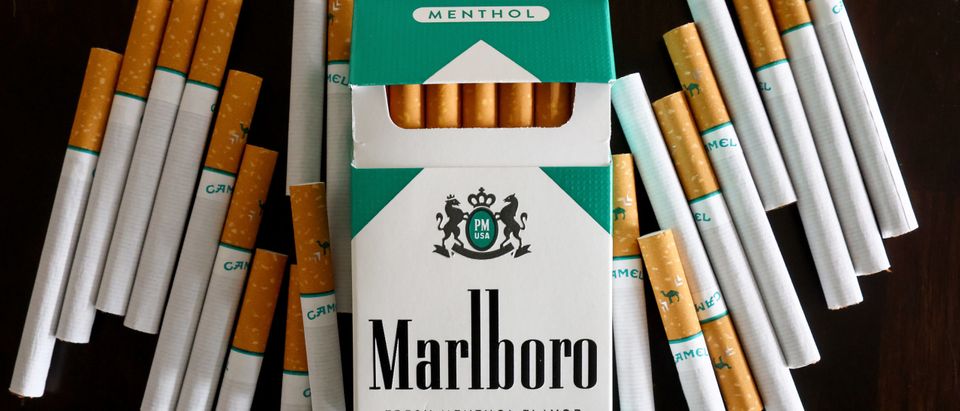The U.S. Food and Drug Administration (FDA) has taken the final steps for a national ban on menthol cigarettes and flavored cigars. Recently, the agency submitted proposed rules to the Biden administration’s Office of Management and Budget. This is the last bureaucratic office to review the rules prior to implementing. This ban will hurt small businesses, take away consumer choice and potentially increase police interactions with lower income communities.
With the ever-encroaching prohibition, the FDA aims to reduce youth tobacco use and also advance “health equity” through a supposed reduction of “tobacco-related health disparities.”
While reducing smoking among American adults is a laudable goal — prohibitions on consumer goods have not correlated with decrease in such goods. Moreover, cigarette rates among adults have and continue to decline, cigar smoking “has remained generally stable” and youth use of both products are at record lows.
These proposed bans fail to consider these public health wins and the negative externalities associated with any ban on current products adults are legally and responsibly using.
Nearly one-third of cigarettes sold in retail stores in the United States are mentholated and an estimated 56 percent of the U.S. cigar market comprises of flavored cigars. Not only are adults responsibly enjoying menthol cigarettes and flavored cigars, it equates to revenue for businesses, as well as governments who impose draconian excise taxes on these products. Removing such a large portion of these products would slash billions of dollars from the American marketplace during a period of economic uncertainty.
Convenient stores are often locations where adults responsibly purchase menthol cigarettes and flavored cigars. Despite being widespread across the U.S., the convenience store industry are small businesses, with more than 60 percent of convenience stores being “single-store operators.” Should the ban go into effect, these small businesses would stand to lose more than $23.7 billion in sales.
States and the federal government would also lose out in excise tax revenue and tobacco settlement payments. The Tax Foundation estimates the states and federal government would stand to lose $7.3 billion in excise tax revenue attributed to cigarettes and cigars, including $6.5 billion in cigarette excise taxes lost due to a menthol ban.
More dubiously, the FDA would stand to lose a good portion of its own funding. The Center for Tobacco Products (CTP) at FDA “is funded solely by tobacco user fees.” More than 83 percent of user fees collected by CTP in the final quarter of 2023 were from combustible cigarettes, amounting to more than $148 million. Should FDA ban one-third, the agency would stand to lose over $200 million annually in user fees attributed to menthol cigarettes.
The proposed ban also fails to consider the historic lows in youth use of combustible cigarettes and cigar products. According to the recently released results from the National Youth Tobacco Survey, less than two percent of American middle and high school students reported currently using either product in 2023. In fact, only 1.6 percent of students reported past 30-day use of either cigars or cigarettes this year. These are some of the lowest levels recorded.
The ban is also unlikely to dramatically reduce use of combustible cigarettes among adults, as statewide flavor bans have not led to reductions in cigarette use. Massachusetts first banned menthol cigarette sales in June 2020, while California’s ban went into effect in January of this year.
In Massachusetts, smoking rates only decreased by 4.5 percent between 2020 and 2021, while nationally, smoking rates declined by 7.1 percent during the same period. Even more alarmingly, the percentage of Massachusetts young adults aged 18 to 24-years-old who were smoking increased by 8.8 percent the year after the ban went into effect. A recent study examining discarded cigarette packs collected from trash bins in California localities this year found that menthol prevalence was reduced by only 13.9 percent.
The only guaranteed outcome from a national ban on certain tobacco products is increased revenue for underground networks. Amoral merchants already provide goods the federal government have deemed illegal, and banning menthol cigarettes and flavored cigars only increases the amount of goods these unscrupulous marketers can push to consumers.
In 2022 it was reported cartels were already producing illicit cigarettes in Mexico in a “network which reportedly manufacturers cigarettes and forces vendors to sell them.” In August, Republican Tennessee Rep. Mark E. Green, Chairman of the U.S. House Committee on Homeland Security, sent a letter to the Department of Homeland Security “urging the agency to work with the [FDA] to halt [the proposed ban] … as these rules could empower cartels to increase their profits by smuggling illicit tobacco products.” In fact, according to the discarded cigarette pack study, more than one-quarter of packs collected this year were cigarettes intended to be sold in non-domestic markets. There are already cross-border sales of illicit products happening.
Rather than imposing draconian bans on adult consumer goods, the FDA should be focusing on other tobacco-control measures, including allocating ample resources towards education and cessation, as well as accelerating the authorization of novel safer tobacco products including e-cigarettes and heated tobacco devices.
Revolutionizing and embracing innovation in a regulated marketplace to account for products that adults are using would allow the agency to target youth use and help adults quit — avoiding significant negative externalities.
Lindsey Stroud is Director of the Taxpayers Protection Alliance’s Consumer Center.
The views and opinions expressed in this commentary are those of the author and do not reflect the official position of The Daily Caller.


